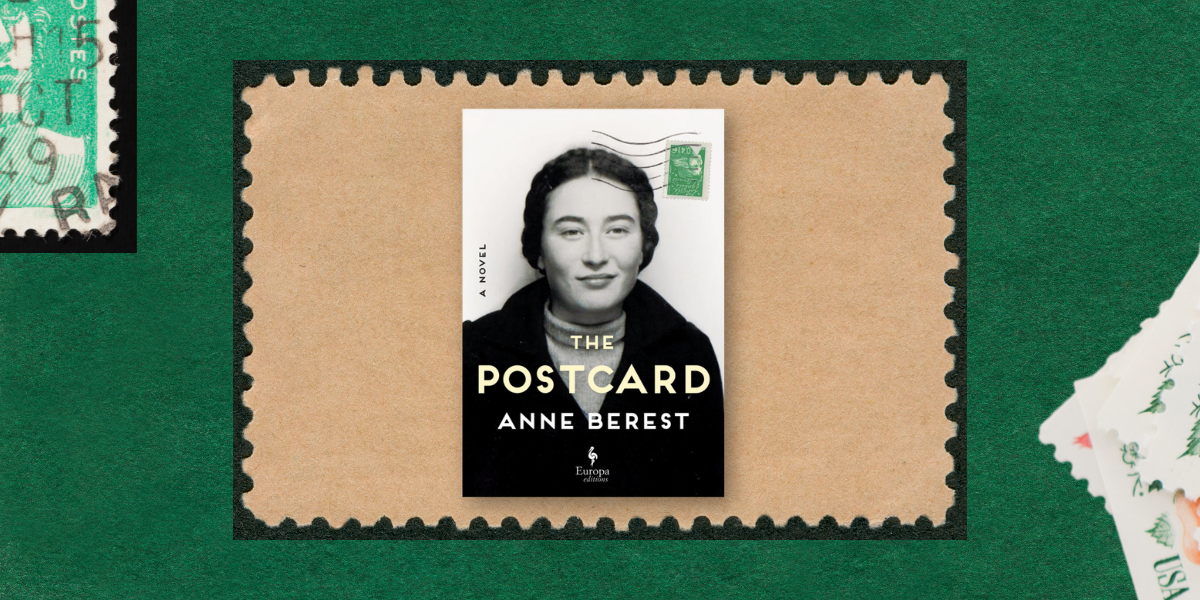Books
Unveiling the Mysteries of ‘The Postcard’

The Postcard
By Anne Berest. Translated by Tina Kover (Europa Editions)
A best seller in her native France, where it was published in 2021, Anne Berest’s The Postcard is now available to English readers in a translation that captures the author’s poetic language and compelling story.
This is a work of autofiction, a genre somewhere between autobiography and narrative fiction. The book re-counts the author’s extensive research into the history of her Ashkenazi Jewish family, how they escaped from revolutionary Russia to Latvia and Mandate Palestine, and finally to France, where Berest was born and grew up with minimal connection to Judaism.
The Postcard begins on a snowy day in January 2003. Anne’s mother, Lélia Picabia, a renowned linguist, receives an anonymous postcard with only a handwritten list of four names—Ephraim, Emma, Noémie, Jacques. The first two are Leila’s grandparents, the Rabinovitches; the latter names are two of their children, Lélia’s aunt and uncle. All four were killed at Auschwitz.
Lélia gathers her husband and daughter to show them the card. They muse about the picture on the front, that of an opera house, and which post office it came from, but the names—people Anne knew only as ancestors murdered during the Holocaust and little else—are not discussed.
“After lunch, my parents put the postcard away in a drawer, and we never talked about it again. I was twenty-four years old, my mind full of my own life, of other stories to be written. I erased the recollection of the postcard from my memory, though I kept hold of the vague intention to ask my mother, one day, about our family’s history.”
Sixteen years later, when Anne’s 6-year-old daughter, Clara, returns from school one day and says, “They don’t like Jews very much at school,” that earlier intention reverberates in Anne’s mind. Even as she struggles with how to respond to her daughter, the statement spurs Anne to research the postcard.
“The idea of finding the culprit became an obsession,” Berest writes. “I had to understand why that card had been sent.”
Anne hires a private detective and a handwriting specialist. She travels with her mother across France to interview anyone who might have known Myriam—Lélia’s mother who had been the sole surviving Rabinovitch—even as Anne attempts to understand herself and her own identity.
Myriam had escaped to France’s unoccupied zone before the roundup of Jews for deportation from her family’s home in Normandy. Ephraim and Emma, of the postcard, were her parents. Yet Myriam, who died in the 1990s, never spoke about the war or her lost loved ones.
Silence is a major theme in Berest’s book. Not only does Myriam stay silent about her Jewish family and the Holocaust, but she also keeps secret her role in the French Resistance. She fought alongside her non-Jewish husband, Vicente, Lélia’s father and the son of renowned painter Francis Picabia. For much of Anne’s childhood, she thinks Myriam’s second husband, Yves, is her grandfather.
Berest is the author of award-winning fiction and nonfiction as well as scripts for television, film and theater. In The Postcard, she deftly intertwines the story of her research with the stories she uncovers. She reserves her fictionalization to the imagined scenes of her ancestors’ lives and even follows her great-uncle Jacques to his last moments in the gas chamber in Auschwitz.
This book delves into quite a bit of history, but perhaps more important than that factual reporting is how the history is reflected in the present-day rise of antisemitism in France. A shroud of fear hangs over the narrative as Anne, the writer, and Anne, the character, both wonder if the postcard was meant as a threat. Could what happened to Ephraim, Emma, Noémie and Jacques happen to her family again? After all, she notes, the Rabinovitches knew when to leave Russia in 1918, but not when to leave France in 1939.
The Postcard was a finalist for France’s prestigious Prix Goncourt. Perhaps more notably, considering the rise of antisemitism worldwide, in 2022 it won the inaugural Prix Goncourt US, an award selected by French literature students from five prestigious American universities.
Elizabeth Edelglass is a Judaic librarian, fiction writer and book reviewer living in Connecticut.









 Facebook
Facebook Instagram
Instagram Twitter
Twitter
Leave a Reply